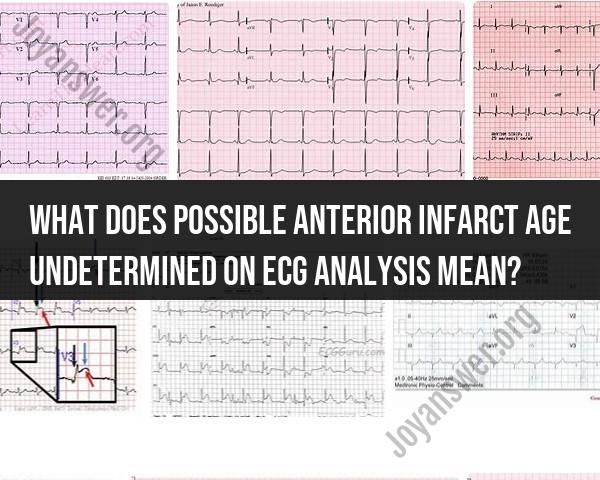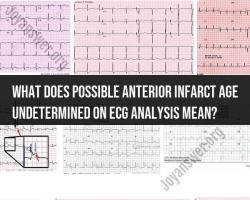What does possible anterior infarct age undetermined on ECG analysis mean?
The term "possible anterior infarct age undetermined" on an ECG (Electrocardiogram) analysis suggests that there may be signs of a previous heart attack (myocardial infarction) in the anterior region of the heart, but the ECG does not provide enough information to determine the exact timing (age) of the infarction. Let's break down this interpretation:
Possible Anterior Infarct: This indicates the possibility of a heart attack (myocardial infarction) that has occurred in the anterior part of the heart. The anterior region of the heart is the front portion, and heart attacks in this area can affect the left ventricle, which is responsible for pumping oxygenated blood to the body.
Age Undetermined: The ECG does not provide enough information to determine when the heart attack occurred. In some cases, ECG changes can provide clues about the approximate age of the infarction. However, the term "age undetermined" suggests that the ECG findings are not definitive in this regard.
It's important to note that an ECG is a snapshot of the heart's electrical activity at the time of the test. It can provide valuable information about the heart's current condition, but it may not always offer a complete picture of the heart's history. To assess the age and extent of a previous heart attack more accurately, additional tests, such as echocardiography, cardiac enzymes, or cardiac imaging, may be needed. Patients with ECG findings suggesting a possible heart attack are typically evaluated further by a healthcare professional to determine the appropriate treatment and management.
What does "possible anterior infarct age undetermined" indicate in the interpretation of an ECG analysis?
The term "possible anterior infarct age undetermined" in the interpretation of an ECG analysis indicates that there are electrocardiogram changes that suggest an anterior myocardial infarction (AMI), also known as a heart attack, but the time of the AMI cannot be determined based on the ECG alone.
AMI occurs when blood flow to the heart muscle is blocked, causing damage to the heart muscle. This damage can cause changes in the ECG, including:
- ST-segment elevation in the anterior leads (V1-V6)
- Q waves in the anterior leads
- T wave inversion in the anterior leads
However, these changes can also be seen in other conditions, such as:
- Pericarditis
- Myocarditis
- Wolff-Parkinson-White syndrome
- Brugada syndrome
- Left ventricular hypertrophy
Therefore, the ECG alone cannot be used to definitively diagnose an AMI or to determine the age of an AMI.
How is the uncertainty about the age of a possible anterior infarction assessed on an ECG?
There are a number of factors that can be used to assess the uncertainty about the age of a possible anterior infarction on an ECG, including:
- The presence of dynamic ECG changes. Dynamic ECG changes are changes in the ECG that occur over time. For example, ST-segment elevation in the anterior leads that is resolving is a dynamic ECG change that suggests a recent AMI.
- The presence of Q waves. Q waves are deep, wide deflections in the ECG that usually indicate old myocardial damage.
- The presence of T wave inversion. T wave inversion can be seen in both recent and old myocardial damage.
- The clinical history of the patient. For example, a patient with a known history of coronary artery disease (CAD) is more likely to have an AMI than a patient with no known CAD.
What further evaluations and considerations may be necessary for cases with undetermined infarct age?
If the ECG shows changes that suggest a possible anterior infarction but the age of the infarction cannot be determined, the patient may need further evaluations to determine the cause of the ECG changes and to assess the risk of future cardiovascular events.
Further evaluations may include:
- Blood tests to assess for markers of myocardial damage, such as troponin and CK-MB
- Echocardiogram to assess the structure and function of the heart
- Cardiac catheterization to assess the coronary arteries for blockages
The results of these evaluations will help the doctor to determine the best course of treatment for the patient.
In general, patients with a possible anterior infarction of undetermined age should be treated as if they have had a recent AMI. This includes aspirin, clopidogrel, heparin, and beta-blockers. The patient should also be monitored closely for signs of heart failure or arrhythmia.



